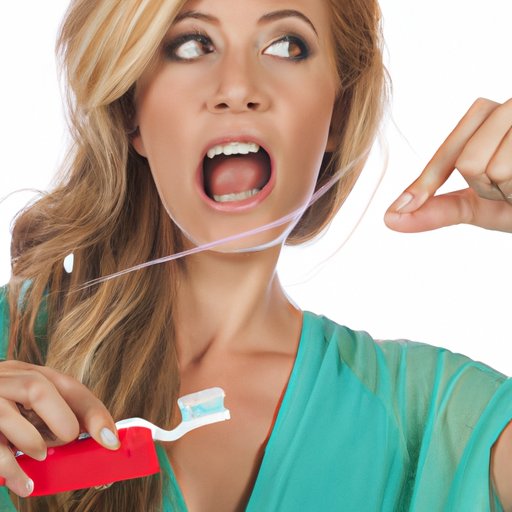Introduction
When it comes to taking care of your teeth, there’s no denying that brushing and flossing are essential. But when it comes to deciding which one to do first, there is often a debate. Should you brush or floss first? This article will explore the pros and cons of both sides of the debate to help you make an informed decision about your dental care.
A Comparison of Brushing and Flossing: What Should You Do First?
Brushing and flossing are two different techniques used to clean your teeth and keep them healthy. Brushing involves using a toothbrush and toothpaste to remove plaque and debris from the surface of your teeth. Flossing, on the other hand, involves using a thin strand of waxed thread to remove food particles and plaque between your teeth and below the gum line.
Both brushing and flossing have their own unique benefits. Brushing can help remove plaque and bacteria from the surface of your teeth, while flossing can help remove plaque and food particles from hard-to-reach areas. Additionally, brushing can help freshen breath and prevent bad breath, while flossing can help reduce inflammation and gum disease.
The Dental Care Debate: Which Comes First, Brushing or Flossing?
The debate over whether to brush or floss first has been going on for years. Some experts argue that brushing should come first because it helps remove plaque and bacteria from the surface of your teeth. Others argue that flossing should come first because it can help reach areas that brushing can’t, such as between the teeth and below the gum line.
The pros and cons of brushing first and flossing first should be taken into consideration. On the one hand, brushing first can help remove plaque and bacteria from the surface of your teeth, which can help prevent cavities and gum disease. On the other hand, flossing first can help remove plaque and food particles from hard-to-reach areas that brushing may miss.
The Right Way to Brush and Floss: Should You Start with Brushing or Flossing?
No matter which method you choose, it’s important to brush and floss correctly. When brushing, use a soft-bristled toothbrush and gentle circular motions to clean the surfaces of your teeth. Make sure to brush all surfaces of your teeth, including the back molars. It’s also important to brush your tongue to help remove bacteria and freshen your breath.
When flossing, use a piece of waxed floss that is at least 18 inches long. Wrap each end around your middle fingers and use your thumbs and index fingers to slide the floss gently between your teeth. Gently move the floss up and down the sides of each tooth to remove any plaque or food particles. Make sure to floss behind your back molars, as well.
It’s recommended that you brush twice a day and floss once a day. However, if you choose to brush before flossing, make sure to wait at least 30 minutes after brushing before flossing. This will give the fluoride from the toothpaste time to work its way into your teeth, making them stronger and more resistant to decay.
Your Oral Health Questions Answered: Should You Brush or Floss First?
When it comes to brushing and flossing, there are many questions that need to be answered. For example, how often should you brush and floss? Is it okay to brush and floss at the same time? Does it really matter if you brush or floss first?
The answers to these questions vary depending on your individual needs and the advice of your dentist. Generally speaking, it’s recommended that you brush twice a day and floss once a day. It’s also okay to brush and floss at the same time, but it’s important to make sure that you are brushing and flossing properly. As for the question of whether it matters if you brush or floss first, the answer is that it doesn’t make much of a difference. As long as you are brushing and flossing regularly and correctly, you should be able to maintain good oral health.
Debunking the Myth: Does It Matter If You Brush or Floss First?
Despite the ongoing debate, there is no scientific evidence that suggests that brushing or flossing first makes a significant difference in your oral health. In fact, studies have shown that brushing and flossing regularly, regardless of the order, can help reduce the risk of cavities and gum disease.
Additionally, some people believe that brushing first can actually damage the enamel of your teeth. However, this is a myth. As long as you are using a soft-bristled toothbrush and gentle brushing techniques, brushing your teeth will not cause any damage to the enamel.
Conclusion
Deciding whether to brush or floss first is ultimately up to you and your dentist. Regardless of which one you choose, it’s important to brush and floss regularly and correctly in order to maintain good oral health.
(Note: Is this article not meeting your expectations? Do you have knowledge or insights to share? Unlock new opportunities and expand your reach by joining our authors team. Click Registration to join us and share your expertise with our readers.)
